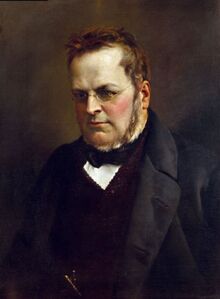|
The wave of nationalism that raced through Europe in the nineteenth century resulted in the unifications of Germany and Italy. During the ill-fated Revolutions of 1848, nationalists in Germany and Italy tried unsuccessfully to unify their nations on the basis of shared language and culture. In Germany, the Frankfurt Parliament failed to secure the support of the Prussian king, who refused the "pig crown" offered to him by the coalition of liberals and nationalists. In Italy, Mazzini and Garibaldi briefly took Rome and established a republic before being forced to surrender to French troops that were allied with the pope. The French intervention in 1848 to stop an attempted liberal-nationalist revolution was an example of Metternich's Concert System working exactly as it was designed to work.
The Crimean War (1853-1856) represented a turning point in the German and Italian Unification movements because it placed European powers on opposite sides of the battlefield for the first time since the Napoleonic Wars. France and Britain joined forces to stop Russia's incursions into Ottoman territory in Crimea. The Crimean War ended an era of cooperation between the Great Powers, while also showing the need for modernization of European armies to make better use of the technologies of the Second Industrial Revolution.
Meanwhile, Otto von Bismarck rose to prominence in Prussian politics. A member of the landed Junker nobility, Bismarck sought to unify Germany under Prussian dominance. In order to do this, Austria had to be defeated and left outside of a unified Germany. In 1815, Austria had been the dominant German state, but Prussia was ready to challenge Austria after a campaign of aggressive industrialization. Under Bismarck's leadership, Prussia modernized its military to incorporate modern technologies, such as telegraphs, railroads, and heavy artillery. In 1866, Prussia handily defeated Austria in the Seven Weeks' War, resulting in the formation of the North German Confederation. In 1870, Bismarck led a coalition of German allies against France in the Franco-Prussian War. After France was defeated, the victorious Germans met at Versailles to proclaim the German Empire.
My three-part lecture series on German Unification will be helpful to students who want to know more.
France's defeat in the Franco-Prussian War paved the way for the final unification of Italy, as French troops were the only barrier stopping the newly-proclaimed Kingdom of Italy from conquering the Papal States. When war with Prussia began, France called its troops home from Italy to defend the homeland. In 1870, Italian military forces marched victoriously into Rome, completing the process of Italian Unification.
0 Comments
Your comment will be posted after it is approved.
Leave a Reply. |
Tom RicheyI teach history and government Archives
May 2023
Categories
All
|




 RSS Feed
RSS Feed